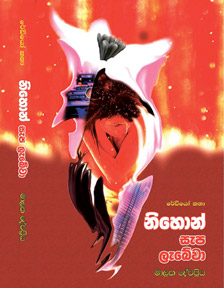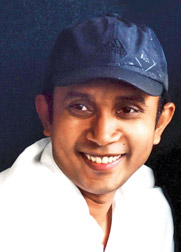Are we heading in the right direction?
Channa Bandara Wijekoon
Decades back, we used to sit in front of the radio in every weekday
to listento ‘Muwan Pelessa’. Characters such as Arachchila, Menike,
Wedikkaraya and Pina gave us a mind-boggling experience of listing to a
radio-play while creating imaginary and personalized visuals in our
minds.
Sri Lanka was the first country to air a radio-play in the South
Asian region.

There is a concept which says: ‘One visual is worth a thousand
words’. According to Malaka Dewapriya the author of ‘Nihon* Sepa Lebewa’
(May you attain comfort while living in Japan), a compilation of
self-written radio-plays, one word can trigger a thousand visuals in a
listener’s mind. Malaka has compiled ten inspirational self-written
radio-plays with rich content in his book. Amongst them, Nihon* Sepa
Lebewa, Bhashmanthara, Mana Widamana and Nirabhishekana take reader on a
trail towards a non-explored zone in human life.
Malaka has graduated from the Colombo University in 2005 and done
further studies in Germany and South Korea on scholarships. He has
excelled as a writer of radio-plays, short films and stage plays.
Philosophy
In his book ‘Radio as an apparatus of Communication’, Bertolt Brecht
says a radio- drama is one of the best means to inspire people to
imagine, think and debate.
“A radio-play is a piece of art which treats the listener as a
co-creator of the storyline. Thus the listener is part and parcel of the
creation itself. A fully fledged radio-drama has the ability to build up
a philosophy in the listener’s mind which enables the listener to
develop the story to a level which was not imagined even by the writer,”
says Dewapriya.
In his book ‘Handa Naluwa Hewath Guwan Viduli Natya’, late
Sugathapala Silva gives an insight to the art of radio-drama.
This medium surpasses other creative mediums such as novels,
short-stories, poetry and even cinema due to its ability to enhance the
‘imagination’ within the listener.
New trends
In the present day, technology is used effectively in the global
context to popularize radio-play. It has now become a means of
communicative entertainment within the cyber space. There are web sites
such as “theradiodramadirectory.com” which facilitates listening to
radio-dramas live. There is also a culture of listening to radio-plays
via mobile phones and iPods. ‘moonlightaudiotheatre.ca’ is connected
with 90 countries and has over a million listeners for radio-dramas in
North America alone. There are international competitions and festivals
dedicated to radio-dramas.
|

Malaka Dewapriya |
Even the ‘fetish and consumption’ concept is used to attract
listeners to radio-drama. BBCs annual budget for radio-plays is 19
million sterling pounds. They have correctly grasped the finer-points of
this art and developed it with innovation to have a dedicated set of
listeners globally. A cumulative radio air time of 1174 hours is used by
the BBC for radio-plays and receives over 10,000 scripts in a year.
Sri Lankan scenario
In the decade of 1930, internationally acclaimed ‘short-stories’ were
adapted as radio-dramas locally. Thus Maupassant’s ‘Necklace’ became
‘Diyamanthi Maalaya’. Likewise, ‘The man who married a dumb wife’ became
‘Golu Birinda’.
In the decade of 1940, when Charlie Chaplin did ‘The Great Dictator’,
David Lean made ‘Bridge on the River Kwai’ and Mehboob Khan did ‘Mother
India’, we did ‘Kadawunu Poronduwa’ and continued in that line. The same
type of un- resourceful contributions hampered development of the local
radio-play.
Scholars like Sugathapala Silva and Thilak Jayaratne grasped this
medium well and went into the extent of doing experiments. Prof. Sunanda
Mahendra and Dharmasena Pathiraja tried to develop a radio-drama
culture. Late M J Perera sent individuals like P Welikela to BBC and got
them trained in 1950 decade.
Since the authorities did not give due recognition and blessings to
this exercise, they could not pursue any further on the subject. Even
today, no literary award ceremony in our country recognizes radio-plays,
in a scenario where international radio-playwright competitions are
being held in many parts of the world.
Are we heading towards the right direction?
In Sri Lanka, we have over 45 radio channels. Neither of these
channels seems to use the concept of radio-drama in an effective manner.
Their sole intention is selling the air-time for profits. With this in
mind they produce inferior quality radio-dramas using catchy dialogs
(indecent at times) to keep the listeners intact, which is also an
unethical means of communication.
Since this awkward category of radio-dramas are no near BBC ones,
they have lost the privilege of benchmarking with global trends, says
Dewapriya.
Television screen will be limited to 48 inches and cinema screen
would confine to 30 feet or so. In contrast, the magic in a radio-drama
to prompt imagination in listeners mind surpasses all boundaries. Also,
it can address thousands of thousands of people in the world within a
particular air-time.
Thus it is high time we gave a serious thought towards taking this
‘art’ of radio-play to the doorstep of the listener, concluded Dewapriya.
[email protected]
|







